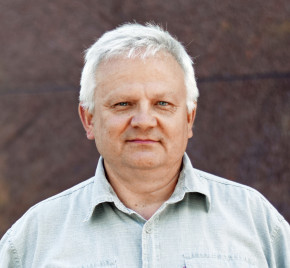
Evgeny Pakhomov
Professor
Chair in the Ocean Environment & its Living Resources; Professor IOF
- Feeding ecophysiology of aquatic invertebrates and fishes
- Antarctic ecology, Antarctic krill biology
- Tunicate biology
- Fishery ecology
- Stable isotope ecology
I am a biological oceanographer with a broad range of interests covering topics from species ecology, at the level from zooplankton to fish, to ecosystem structure as well as physical-biological and biochemical coupling. Most of my research has been done in the Southern Ocean. Recently, I have developed interests in stable isotope ecology, in particular in techniques that use compound specific measurements to reconstruct trophic pathways in pelagic ecosystems. During the past several years, I have also been involved in research studying variability and responses of marine ecosystems to climate change using stable isotopes, large-scale and retrospective analyses. My secondary research interests concentrate on projects studying the land-sea interface, particularly how land use and population density in catchments affect the stable isotope ecology of riverine, estuarine and coastal ecosystems.
Main research projects:
- Midwater food webs project aims: to develop a broad understanding of the fundamental ecological principles driving the composition, diversity, density and stability of the midwater plankton and micronekton communities in the world ocean. It is started as a comparative study to identify the differences/similarities in the community and food web structure (carbon cycling) in different ecological realms, including the mesopelagic zones of polar (Antarctic), temperate (Chatham Rise) and tropical (near Hawaii) regions.
- Rivers Inlet Ecosystem Study (RIES) is formulated around the aim: to develop an understanding of factors influencing the early life history of Rivers Inlet sockeye salmon (Oncorhynchus nerka), with special focus on spring plankton abundance in the inlet.
- Salmon resilience - the impact of climate change and fisheries on sockeye salmon's genetic diversity and population structure: this project aims to gain a better understanding of the interaction of overfishing and climate change in declining fish populations. This study focuses on sockeye salmon as a species of key importance in the Pacific Northwest.
- Understanding the ecosystem role of Pacific herring in coupled social-ecological systems: advancing forage fish science: a multi PI NSERC Strategic project aiming to assess ecosystem services provided by forage fish, in particular Pacific herring.
Other projects:
- Southern Ocean ecosystems: the main focus of this international, ongoing is to investigate during different seasons sea ice and midwater zooplankton communities in the Southern Ocean.
- The Chatham Rise ecosystem modeling: plankton and micronekton missing link: Joint project between the National Institute of Water and Atmospheric Research of New Zealand (NIWA) and EOAS, UBC with the aim to inform the ecosystem model of the region on the functional importance of micronekton communities.
- The krill pump: Transferring carbon across a layered ocean in a changing climate: Collaborative project between The University of New South Wales (Australia) and EOAS, UBC to investigate the changing role of euphausiids in the carbon transfer due to global climate change.
Recent projects:
- Coastal Ecosystem Services amongst Trophic Cascades. It is a multi-PI NSERC Strategic Project with aims to (i) assess ecological changes associated with otters and kelp forests, including 'nutrient subsidies' from kelp forests to adjacent and distant ecosystems; (ii) represent these changes in a spatial model that depicts the effects of various human interventions on ecosystems; and (iii) evaluate the monetary and non-monetary values associated with changes in ecosystem services like the provision of various subsistence, recreational, and commercial fisheries.
- Fractal and multifractal analysis of high resolution biological and fisheries data sets: identifying sources of variability and implications for forecasting.
- Marine Ecosystem Modeling of the Sub-Antarctic Prince Edward Island Archipelago.
- Assessing changes in jellyfish populations: an evaluation of abundance trends in Large Marine Ecosystems.
- Invasive species ecology has two subprojects under the Canadian Aquatic Invasive Species Network (CAISN): (i) assessing the risk of invasive species transport by recreational boat hull fouling and (ii) examining the relationship between propagule pressure and invasive species establishment in Canadian ports.
M.Sc. Kazan State University, Russia (1983)
Ph.D. P.P. Shirshov Institute of Oceanology, Russian Academy of Sciences, Moscow (1992)
Post-Doctoral Fellow, Rhodes University, South Africa (1993-1996)
Southern Ocean Group, Rhodes University (1996-2001)
University of Fort Hare, South Africa (2001-2003)
Alexander von Humboldt Foundation Fellow: Alfred Wegener Institute for Polar and Marine Research, Bremerhaven, Germany (2002)
Adjunct Professor, University of Fort Hare (2004-2009)
Professor, Department of Earth, Oceans and Atmospheric Sciences, UBC (2003-present)
Director, the Institute for the Oceans and Fisheries, UBC (2016-2021)
Professor, the Institute for the Oceans and Fisheries, UBC (2015-current)
Graduate Students
-
PhD Oceanography
-
PhD Oceanography
-
PhD Oceanography
-
Postdoctoral Fellow Oceanography
-
Postdoctoral Fellow Oceanography
-
MSc
-
PhD Oceanography
-
MSc Oceanography
-
PhD Geological Sciences
-
MSc
-
MSc Oceanography
-
MSc Oceanography
Research Team:
Dr. Boris Espinase, Post Doctoral Fellow
Dr. Natasha Henschke, Post Doctoral Fellow
Ms. Lian Kwong, PhD Student
Ms. Natalie Mahara, MSc Student
Ms. Samantha James, MSc Student
Ms. Vanessa Fladmark, MSc Student